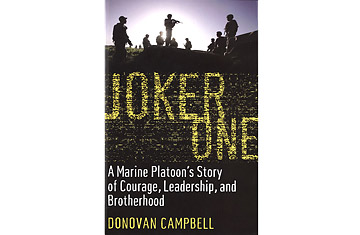
Joker One: A Marine Platoon's Story of Courage, Leadership, and Brotherhood
By Donovan Campbell
313 pages; Random House
The Gist:
During his junior year at Princeton University, Donovan Campbell decided to take the Marine Corps officer training course. Good for the resume, he thought — until he grew to embrace the Corps' ideals of service, honor and sacrifice. Campbell was soon a lieutenant in charge of a platoon thrust into Ramadi, Iraq in 2004, right as that city's insurgency blossomed. Unlike Fallujah, a city full of jihadists with very few civilians, Ramadi was "a much blurrier battle, a classic urban counterinsurgency, a never-ending series of engagements throughout the heart of a teeming city where our faceless enemies blended seamlessly into a surrounding populace of nearly 35,000 civilians." In Joker One, Campbell writes of his almost eight months in Iraq, with all the blood and confusion that one expects from a commander who has had his boots on the ground. ("See a TIME photographer's Iraq photo diary.")
Highlight Reel:
1. On calling into base after his first encounter with the enemy: "I stopped moving and tried to slow my breathing. It was my first firefight; I didn't want to sound frantic or panicked on the radio, since how you sound when you call in during your first enemy contact can come to define how you're viewed by those above and below you for the rest of your tour. Frantic-sounding lieutenants lose everyone's confidence immediately."
2. On a soldier's thirst for any sort of pop culture: "Toward the middle of our second week in-country, Noriel walked into his squad's room to find the long, skinny Mahardy and the short, fireplug-like Guzon lying together on a lower bunk bed, both wearing nothing but their short green nylon shorts and watching The Notebook, a romantic tear-jerker ... Noriel, of course, immediately ridiculed the odd couple for their supremely unmanly choice of movie ... Four days later, having exhausted his own entertainment supply, [Noriel] surreptitiously made his way into an unoccupied squad room, snagged The Notebook, and brought it back to a packed NCO room. Half an hour later, I found him, along with Leeza and Bowen, watching the movie with tears running down their faces."
3. On wounds: "Shrapnel wounds almost always look like someone took a jagged shovel and dug a chunk of flesh out of the body, then filled it in awkwardly with hairless, discolored skin that shouldn't be on a human being. Burn wounds are smoothly hideous, like the skin was turned into peanut butter and then spread in stretched, uneven dollops on the body. Or maybe you come back missing a finger or your face, or the whole or parts of your limbs. Maybe your eyes are gone."
The Lowdown:
Joker One is a perfectly serviceable Iraq War memoir. You've got your typical collection of grunts and a number of gripping battle set pieces. There are scenes of heroism and others of heartbreaking folly — a soldier accidentally struck down by a Marine Humvee driving through the night, a truck that rolls over and crushes a group of Iraqi detainees — the likes of which can be found in endless wartime chronicles. Where Campbell's narrative resonates is in his evocation of the growth of a young military leader. As he grapples with how best to discipline his men, when to stand up for them and how purposeful and calculated a military leader must be in the management of his troops, Campbell traces the development of a skill set as important as any battlefield tactic or strategy. The flip side of that, however, is a fawning depiction of Campbell's men (they are all brave, they are all worthy), leaching them of any real complexity or humor. Regardless, Joker One manages to show its best, most unique face through a thick and all-too-familiar fog of literary war narratives.
The Verdict: Skim
